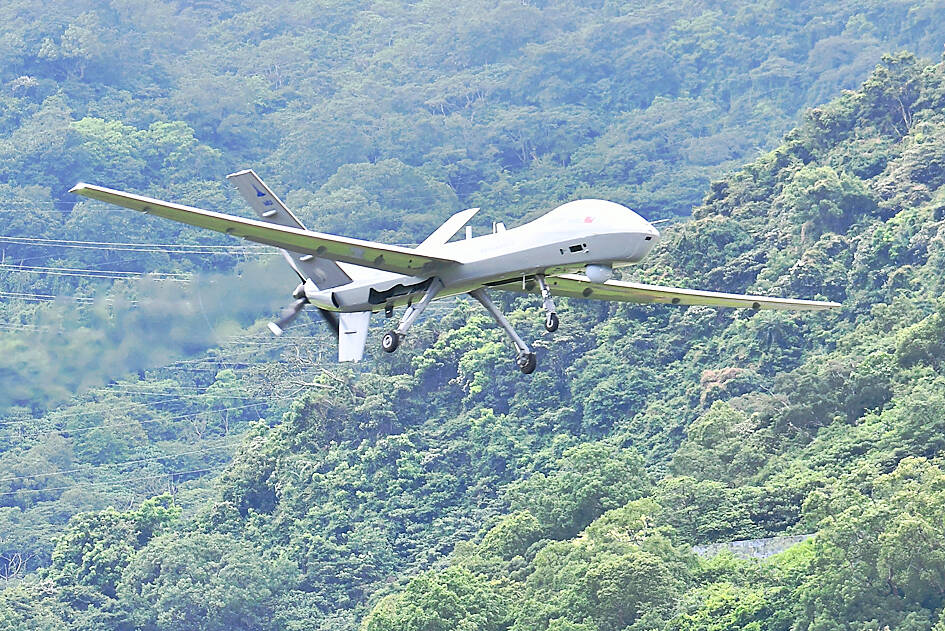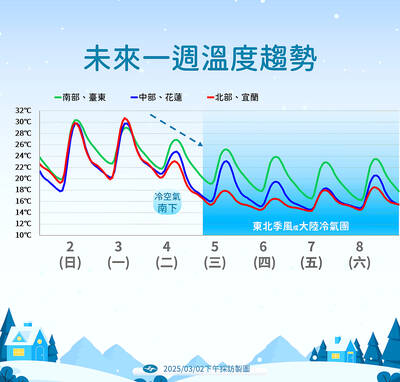The military is compiling a final evaluation report on a second-generation Teng Yun (騰雲, “Cloud Rider”) drone after tests of the self-developed uncrewed aerial vehicle were completed last month, a military source said yesterday.
Faced with the military threat from China, the military has increased research and development of drone technology as military and commercial drones have played a critical role in enabling Ukraine to deter a full-scale Russian invasion.
Aside from the 1,779 commercial drones that were built for military use through partnerships between the military and the private sector, the Chungshan Institute of Science and Technology has developed drones with military specifications, including small “cardinal” drones, medium-sized “albatross” drones, large Teng Yun drones and drones that carry loitering munitions.

Photo: Yu Tai-lang, Taipei Times
The Armaments Bureau has also developed multiaxial drones that can carry rifles and howitzers.
The first-generation Teng Yun drones did not meet the needs of the military and were not transferred to the air force, the source said.
However, the second-generation drones are equipped with a new engine, and the configuration and systems have been redesigned, the source said.
The first phase of evaluation of the second-generation Teng Yun drones was completed in mid-March 2022, and functions such as automatic takeoff and landing, as well staying in the air for nearly 24 hours, have been tested using satellite guidance and control, the source said.
Air force personnel received training to operate the drones from the institute in January and February last year, and entered combat evaluation in March of the same year, the source said.
As certain parts of the drones were identified as needing improvement during the air force combat evaluation, the software and hardware of the Teng Yun drones were updated and retested beginning in mid-March this year, the source said.
The combat evaluation was completed in the middle of last month, the source said, adding that the military is compiling the final evaluation report before entering the next phase of operations.
Although the model of the second-generation Teng Yun was unveiled at the 2019 Taipei Aerospace and Defense Technology Exhibition, public information from the institute shows that the drone’s subsystems and mounted equipment have all been developed and re-evaluated, including satellite guidance and control, electronic surveillance and synthetic aperture radar systems.
The drone also has a redundancy design for flight control and navigation, the institute said, adding that a backup mechanism would be activated if a flight fails.
Although the drone’s power system is the same as the MQ-9B drone purchased from the US military, the remaining components are mostly made in Taiwan, the institute said, adding that it would help lay the foundations for the development of domestically produced drones.

SECURITY: The purpose for giving Hong Kong and Macau residents more lenient paths to permanent residency no longer applies due to China’s policies, a source said The government is considering removing an optional path to citizenship for residents from Hong Kong and Macau, and lengthening the terms for permanent residence eligibility, a source said yesterday. In a bid to prevent the Chinese Communist Party (CCP) from infiltrating Taiwan through immigration from Hong Kong and Macau, the government could amend immigration laws for residents of the territories who currently receive preferential treatment, an official familiar with the matter speaking on condition of anonymity said. The move was part of “national security-related legislative reform,” they added. Under the amendments, arrivals from the Chinese territories would have to reside in Taiwan for

CRITICAL MOVE: TSMC’s plan to invest another US$100 billion in US chipmaking would boost Taiwan’s competitive edge in the global market, the premier said The government would ensure that the most advanced chipmaking technology stays in Taiwan while assisting Taiwan Semiconductor Manufacturing Co (TSMC, 台積電) in investing overseas, the Presidential Office said yesterday. The statement follows a joint announcement by the world’s largest contract chipmaker and US President Donald Trump on Monday that TSMC would invest an additional US$100 billion over the next four years to expand its semiconductor manufacturing operations in the US, which would include construction of three new chip fabrication plants, two advanced packaging facilities, and a research and development center. The government knew about the deal in advance and would assist, Presidential

‘DANGEROUS GAME’: Legislative Yuan budget cuts have already become a point of discussion for Democrats and Republicans in Washington, Elbridge Colby said Taiwan’s fall to China “would be a disaster for American interests” and Taipei must raise defense spending to deter Beijing, US President Donald Trump’s pick to lead Pentagon policy, Elbridge Colby, said on Tuesday during his US Senate confirmation hearing. The nominee for US undersecretary of defense for policy told the Armed Services Committee that Washington needs to motivate Taiwan to avoid a conflict with China and that he is “profoundly disturbed” about its perceived reluctance to raise defense spending closer to 10 percent of GDP. Colby, a China hawk who also served in the Pentagon in Trump’s first team,

The arrival of a cold front tomorrow could plunge temperatures into the mid-teens, the Central Weather Administration (CWA) said. Temperatures yesterday rose to 28°C to 30°C in northern and eastern Taiwan, and 32°C to 33°C in central and southern Taiwan, CWA data showed. Similar but mostly cloudy weather is expected today, the CWA said. However, the arrival of a cold air mass tomorrow would cause a rapid drop in temperatures to 15°C cooler than the previous day’s highs. The cold front, which is expected to last through the weekend, would bring steady rainfall tomorrow, along with multiple waves of showers